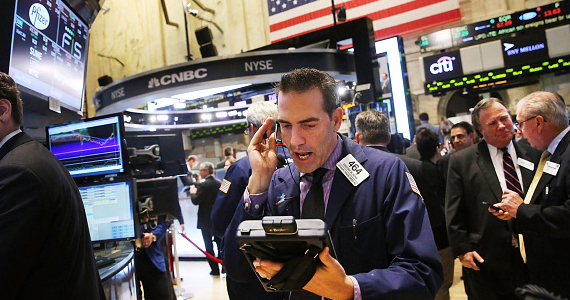(单词翻译:单击)
If Guy Debelle was a hedge fund trader, he might have made a killing this week. Three days ago Mr Debelle – a top official at Australia’s central bank – predicted that markets were heading for wild volatility, since investors were naive about structural risks. A “sizeable” number of them, he observed, probably presumed that they could exit their positions before any sell-off. “History tells us that this is generally not a successful strategy,” he warned. “The exits tend to get jammed unexpectedly and rapidly.”
假如盖伊•德贝尔(Guy Debelle)是一名对冲基金经理,那么本周他已经大赚了一笔。三天前,这名澳大利亚央行的高官预言,由于投资者对结构性风险缺乏认识,市场将出现剧烈的波动。他表示,数量“可观的”投资者很可能认为,他们能在发生任何抛售前退出自己的头寸。“历史告诉我们,这一策略总体上是不成功的,”他警告称,“出口往往很快就会变得出人意料的拥挤。”
A day later his prediction came true. On Wednesday volatility exploded in the markets, prompting the price of Treasury bonds to swing wildly and European stocks and bonds to move violently. While these swings may fade in coming days, the importance of Mr Debelle’s message will not. This week’s gyrations have shown that the question of “liquidity” – the degree to which assets can be traded – matters hugely.
刚过了一天,德贝尔的预言就应验了。本周三,市场波动性急剧上升,导致美国国债价格大幅起落、欧洲股市和债市剧烈震荡。这波震荡可能会在未来几天里减弱,但德贝尔传递出的消息的重要性不会减弱。本周的震荡已经证明,“流动性”(即资产交易的容易程度)问题极其重要。

What is worrying is liquidity appears to have decreased because unorthodox monetary policy experiments have collided with financial reforms and technological upheaval in an unexpectedly pernicious way. Or to cite Mr Debelle: “Market liquidity is structurally lower now than it was in the past. [This] is not evident in a rising market when assets are being bought, but will quickly become apparent in a down market.”
令人担忧的是,目前流动性似乎已经降低,原因是非常规货币政策实验与金融改革和技术变革发生了“撞车”,而这场“撞车”的危害超出人们意料。或者用德贝尔的话说:“从结构上看,当前的市场流动性低于过去。(这)在大家争相购买资产的上扬行情中并不显眼,但在市场下滑时很快就会显现出来。”
To a non-banker, that might seem odd. Since the 2008 crisis, western central banks have flooded the system with cash and expanded their balance sheets by – depending on how you calculate it – an eye-popping $7tn-$10tn. But the problem with “liquidity” is that the word can mean several things; having lots of money in the system does not guarantee that funding will flow freely, or that traders can cut deals. Systems flooded with cash can sometimes freeze.
对银行界以外的人而言,这看上去或许有些奇怪。自2008年的危机以来,西方央行向银行体系注入了巨额资金,将它们的资产负债表扩大了7万亿至10万亿美元(具体数字取决于你的计算方式),规模令人瞠目结舌。但“流动性”的问题在于,这个词可以有多层含义;银行体系中资金充裕并不能确保资金就会流动自如、或者交易员就能达成交易。资金充裕的体系有时也会冻结。
Sometimes this occurs because investors lose faith in each other and stop doing trades, as they did in 2008. But markets can also become illiquid because it is difficult to match buyers and sellers. This last problem, above all else, created this week’s wild price gyrations in Treasuries and much else.
发生这种情况,有时是因为投资者彼此失去了信任、停止了交易,就像他们在2008年时那样。但是,难以撮合买方和卖方成交也会导致市场流动性不足——这是造成本周美国国债和其他许多市场价格剧烈震荡的首要原因。
There are at least four reasons behind the current liquidity problem. The simplest is lopsided investor views. A Bloomberg poll last week revealed that 100 per cent of market economists – yes, 100 per cent – predicted that US interest rates would soon rise. This consensus is unusual, and it meant that when investors became gloomier about the economic outlook at last weekend’s International Monetary Fund meetings, many tried to shift their trading positions at the same time.
在当前的流动性问题背后,起码存在四个原因。最简单的一个就是投资者的看法“一边倒”。上周彭博(Bloomberg)的一项调查显示,100%的市场经济学家——没错,是100%——预测,美国的利率很快就会上升。这种共识非常罕见,它意味着,上周末国际货币基金组织(IMF)会议给出的经济前景让投资者感到更加悲观时,许多人试图在同一时间改变自己的交易头寸。
A second reason is that asset managers are becoming more prone to acting as a herd – reinforcing the challenge of matching buyers and sellers. This is partly because investors are increasingly using similar benchmarks to judge performance. The biggest fund managers are also surging in size, creating more industry concentration. In emerging markets, for example, the Bank for International Settlements estimates that the top 20 global asset managers hold 30 per cent of all bonds and equities – double the level a decade ago. Similar trends can be seen in other markets
第二个原因是,资产管理公司越来越倾向于像羊群一样行动——这加剧了交易撮合上的挑战。这一现象的部分原因在于,投资者越来越多地使用相似的基准来评判市场的表现。大型基金管理公司的规模也在快速膨胀,行业集中度变得更高。比如,国际清算银行(BIS)估计,最大的20家全球性资产管理公司持有新兴市场的全部债券与股票的30%,这一比例两倍于10年前。在其他市场,也可看到类似的趋势。
A third issue is the growing use of computer programs to execute trades. In theory this should make markets more liquid since computers can match trades around the world at lightning speed. But the programs that techies at hedge funds and banks create tend to look alike. Computers – like humans – are thus moving as herds, intensifying the imbalance.
第三个原因在于,证券交易正越来越多地通过计算机程序来执行。这理应增强市场流动性,因为计算机可以在世界范围内以闪电般的速度撮合交易。但是,对冲基金和银行的技术人员开发出的程序往往很相似。结果,计算机像人一样呈现羊群行为,强化了失衡状态。
But the thorniest issue is regulation. In the past big investment banks often matched buyers and sellers by holding large inventories of securities. But since 2008 banks have slashed their inventories by between 30 and 80 per cent (depending on the asset class) to meet tighter rules. This reduced their ability to act as market makers, and removed shock absorbers from the system,
不过,最棘手的原因在于监管。过去,大型投行常持有大量证券以撮合交易。但自2008年以来,银行已将所持的证券砍掉了30%至80%(具体数字取决于资产类别),以满足更严格的监管规则。这降低了它们的做市能力,从银行体系中抽走了“减震器”。
Is there any solution? Central bankers have debated whether government bodies should make markets in a crisis. Regulators are also moving to impose curbs on automated trading programs, and the US Office of Financial Research is trying to monitor investor herds with more precision. Unsurprisingly, private sector banks are now lobbying for another potential “solution”: a reversal of recent regulatory rules.
有什么解决方案吗?就政府部门在危机中是否应出面做市,央行官员们展开了辩论。监管人士也在采取行动限制自动交易程序,美国金融研究办公室(US Office of Financial Research)正试图更加精确地监控投资者的羊群行为。令人不感意外的是,私人部门银行业现在正游说官方采纳另一种可能的“解决方案”:重新放松监管。
But given the political heat around banking, do not bet on that last move happening soon. And that has an unnerving implication: though the banking system may be safer than it was before 2008, parts of the markets may have become more dangerous for unwary investors, given all that herd behaviour. Or to put it another way, the most important point about this week’s price swings is that they may be merely a foretaste of what could happen when central banks finally put rates up again (rather than endlessly talk about it). Investors stand warned.
但考虑到银行业在政治上引发的争议,别指望最后一种方案能很快变为现实。此外,本周的事态还间接表明了一个令人不安的事实:尽管银行体系现在可能比2008年之前更安全,但考虑到各种羊群行为,某些市场领域对不够警觉的投资者来说可能已变得更加凶险。换言之,关于本周价格震荡的最重要一点是,它可能仅仅是当央行最终再次加息(而非无休止地谈论加息)时将发生局面的一次小型预演。投资者要保持警觉。


